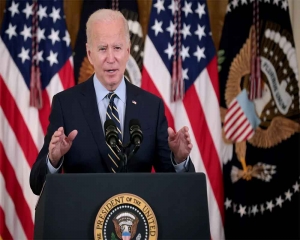Rahul should defer his resignation until he works out a system of open election of leaders in which he, too, will contest on equal footing with others
I remembered Leon Trotsky when it became clear that the Indian National Congress was going to be routed in the recent Lok Sabha elections. Addressing the Mensheviks and others who were opposed to the violent seizure of power by the Bolsheviks, and were walking out of the Second All-Russian Congress of Soviets at Petrograd, he had said on October 25, 1917, “Go to the place where you belong from now on — the dustbin of history!” One now needs to ask: Is the Congress headed toward the same destination? Many think it is.
Why they think so becomes clear from looking at the reasons why the Congress lost. The first reason, of course, was Prime Minister Narendra Modi’s personal charisma and communicative skills as well as BJP chief Amit Shah’s organisational mastery. It, however, was also due to the Congress’s failure to make a contest of it — the causes of which, already discussed threadbare, merit only a brief mention. It failed to counteract Mr Modi’s charisma. Its efforts to link him with corruption in the Rafale deal did not work. Its slogan “Chowkidar Chor Hai” had little impact given its failure to present evidence intelligible to common people. On the other hand, its abusive nature only served to deny the Congress a moral high ground vis-à-vis allegations of a personal nature made by Mr Modi and others in the BJP.
Second, the party’s political narrative, based on secularism and democracy, could not counter the BJP’s one woven around the themes of strident nationalism and countering the internal and external threats to the country — the latter mainly from Pakistan. It highlighted Mr Modi’s resort to the Balakot air strike following the Pulwama terror attack and contrasted it with what it called the Congress’s earlier pusillanimous responses to provocations, particularly the 26/11 terror attack. Third, the Congress could not press home its criticisms on issues like unemployment, economic slowdown and the negative consequences of demonetisation, which it belatedly sought to highlight. Finally, it had greatly exaggerated notions of its prospects at the polls which made it unwilling to go an extra mile to stitch together at least a workable, nationwide seat-adjustment among opposition parties. Poor messaging explains its failure to get its political narrative across. The party’s manifesto, a good summary of its policies and intentions, was beached by faulty delivery. Besides, the Congress had no idea of the ground realities, which accounts for its highly exaggerated notions of its own prospects, spurning of alliances and focussing on winning the maximum number of seats it could. These weaknesses, in turn, derived from the party’s poor leadership and cadre mobilisation which, again, had resulted from its dynastic leadership at the helm. It has kept away self-respecting people unwilling to genuflect before the Gandhi family. Few such persons would, for example, even think of saying what a senior Congress leader said a couple of years ago, “Rahul is our leader and we march at his command.” It led to the sidelining of competent leaders considered capable of, or wanting to, challenge Mr Rahul Gandhi’s leadership. Witness how Mr Y.S. Jaganmohan Reddy was treated — hounded according to some — by the party because he was perceived to be seeking to become chief minister which his father, YS Rajashekhara Reddy, had been. The result? Mr Reddy left the Congress, which was wiped out in Andhra Pradesh in the recent Lok Sabha elections.
Third, dynastic leadership has led to the rise of leaders known more for their loyalty to the family than capability. These leaders, in turn, have chosen as their lackeys people more on the ground of personal loyalty than capability, besides trying to promote their own children. Consequently, dubious leaders pack the party. Worse, it has not only given its regional satraps latitude but rebuffed those protesting against the manner of their functioning, forcing some of them to quit. A striking example is that of Himanta Biswa Sarma, who left the party and subsequently joined the BJP, causing the Congress serious electoral reverses in Assam.
The Congress needs a root-and-branch transformation, including the replacement of dynastic leadership by one based on open contestation. There may be transitional problems given that it has not functioned like this for decades. For example, the losers may make functioning difficult for the winning leader. Some of them may even leave the party whose fortunes seem to be in the dumps. Mr Gandhi should, therefore, defer his resignation until he puts through a system of open election of leaders in which members of the dynasty, seeking leadership roles, have to contest on an equal footing with the others. Withdrawal now would attract ridicule as a stage-managed drama with the end scripted at the beginning and damage his image. Mr Gandhi, who has come a long way since making his debut, can play a critical role in the party even after ceasing to be president — building up its organisation for political mobilization and delivery of its ideological message to the masses. These are important but very difficult tasks that need to be performed if the party is not to end up in history’s dustbin.
(The author is Consulting Editor, The Pioneer)

























